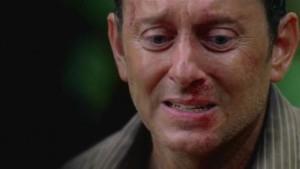 Can we talk about irony for a second?
Can we talk about irony for a second?
Yeah, I know: this is an Overthinking Lost post. We should be talking about Egyptian mythology, or Jungian psychology, or, I dunno… Jesus? But today I’d like to take off my former-English-major hat, if only for a moment, and replace it with my writer hat. Because, damn, people. That was a well-written episode.*
Irony in Lost: A Retrospective.
In Ancient Greek, the word “eironeia” (a.k.a. “irony”) means “deception,” so what better episode to discuss this concept than one about Ben Linus, the most deceptive character in the history of ever? Almost every millisecond of Dr. Linus was infused with some brand of irony:
Verbal irony: Miles’s delicious “UH OH!” before the title screen.
Situational and/or cosmic irony: Lapidus missed Oceanic 815 because he overslept, but he still ended up crash landing on the Island, anyway.
Another example of situational irony: Now RICHARD is the screwed-up suicidal unbeliever and JACK is the one with all the answers.
“Ironic echo”: When Miles repeated Ben’s line about seeing someone standing over a body with a bloody knife.
An example of what I like to call “meta-level” irony: That moment when Miles mentioned Nikki, Paolo, and the diamonds, which made me chuckle and say, “Hey, the writers DIDN’T forget about them, after all!”
But really, the big winner in this week’s “irony contest” was Aristotle’s favorite: dramatic irony. In case your memory is foggy, that’s the type of ironic tension that occurs when the audience knows something that the characters do not. For instance, when Othello says, “Man, Iago, you’re a really great friend,” that’s dramatic irony. And when Oedipus says, “I’m going to catch that bad man what killed my paw!” that’s dramatic irony, too.
It’s also type of irony that I think I’m going to begin referring to as HA!-type irony, because if you look at my notes from this week’s Lost episode, this is what you will see:
- HA! Alterna-Ben’s talking about Napoleon’s exile on an Island! (Alterna-Ben doesn’t know he’s a Napoleon figure.)
- HA! Alterna-Ben is an idealist who cares about the children! (He doesn’t know that, in 2007-World, he’s a selfish, amoral pragmatist who murdered the Dharma children and let his own teenage daughter die.)
- HA! Alterna-Ben is lovingly gassing his dad! (He doesn’t know that, in the other Universe, he killed his dad by gassing him.)
- HA! at “Dr. Linus, you’re the best!” (Alterna-Ben doesn’t know that, in the other Universe, Alex loathed him.)
And so on.
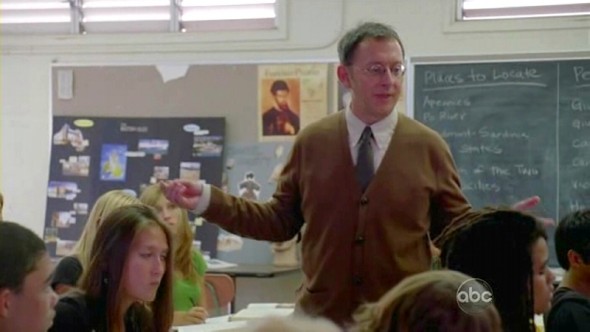
Also ironic: in Sideways Universe, Ben dresses like Mr. Rogers.
We Lost fans are always going on about how little we, the audience, know in comparison to how much the writers know and withhold from us. That’s obviously a huge part of Lost, but Dr. Linus reminded me that it’s not the best part. No, Lost is at its best when it operates the other way, when the viewers know more than the characters do, not the other way around.
I’d argue that this is why Lost’s season 1-3 flashbacks were so popular. Yes, it’s always great to have background information to round out a character. But you know what’s better? Knowing things about a character that the other characters do not know! Shocks and surprises are loads of fun—remember when Sun started speaking English out of nowhere? Pretty great, wasn’t it? But wasn’t it also great to watch Sun try to not speak English in front of Jin, even when we, the audience, knew that she could? Mmm, the dramatic tension! Didn’t you just want to eat it up?
Lost’s dramatic irony became even more pointed during season 4 when the writers started making use of the flash-forward. On Island, we saw Jack saying, “I’m going to get these people home to the mainland, and we’re going to have our happy ending, damn it!” But we already knew from the flash-forwards that only six of them were going to be saved and that Jack wasn’t going to be happy about being home. Dramatic irony: the stuff flash-forwards are made of.
Dramatic irony, then, was the reason I originally thought the flash-sideways were a fun idea. Okay, some of them didn’t work so well (*cough* Kate’s), but the best of them show how Lost can wield dramatic irony like a knife, not only in a superficial “ha-ha” way but in a tragic “if only they knew!” way.
Don’t you agree, Dr. Linus?
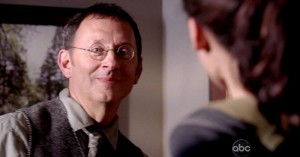
"Totally."
Irony in “Sundown” and “Dr. Linus.”
This is the reason I liked this week’s episode so, so much more than last week’s. Sayid and Ben have long been two of my favorite Lost characters, so I should have appreciated their “centric” episodes equally. But Sayid’s episode, for all of its sound and fury, fell flat for one simple reason: it lacked irony. Let’s compare and contrast, shall we?
Sayid’s story has always been the same. It’s a tragic tale of thwarted redemption. Sayid has tried harder than anyone, since the beginning of the series, to make up for his violent past, but, time and again, he falls back into his old patterns. “My name is Sayid Jarrah, and I’m a torturer.” Tragic, man. Just tragic.
But by the sixth season, I wanted to see something new in his story. In the flash-sideways of other characters, we saw their old stories from a new angle. Jack’s flash-sideways in Lighthouse, for example, looked at his old themes of daddy-hatred, but this time Jack was the father, not the son. We also saw that, contrary to what 2007-Island-Jack said, he actually has the capability to break the cycle of abuse, move past his daddy-issues, and become a better father. That’s dramatically ironic, but in a more subtle way: we, the audience, now know something Island-Jack doesn’t know about himself. To me, that’s really satisfying.
Likewise, this week, we learned something about Ben that Ben didn’t know about himself: that he could be selfless. That’s not “ha-ha funny,” but it is ironic. We know more about a character and his situation than the character knows himself. For once, we had a leg up on old Ben Linus.
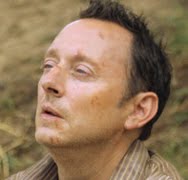
"Don't be so sure, bub."
Sayid’s flash-sideways, on the other hand, merely rehashed his old story. Nothing new was learned, either by Sayid or by the audience. Oh, he’d kill for Nadia? Shrug. He had already shot himself for her back in season one. So color me unsurprised when he shot Keamy, a character almost anyone in their right mind would shoot without a second thought. This isn’t dramatic irony. This is repetition. Boring, bleak repetition.
Here, look at this chart I made. It’ll probably make my point better than my paragraphs ever could:
If Sayid’s flash-sideways had included more dramatic irony, I might have bought his Island-side conversion to the Dark Side a little more. If I had written Sundown, the chart would have looked a little more like this:
2007-SAYID THINKS: That no matter how hard he tries to be redeemed, he’s fated to be a murderer
WE LEARN FROM THE FLASH-SIDEWAYS: That Sayid never actually wanted redemption at all; he just wanted Nadia
HOW WE LEARN THIS: The flash-sideways starts the same way as the one we saw in Sundown, except Keamy DOES kill Omer. Then alter-Sayid steps out of the shadows and says, “Well done, Keamy. Here is your payment.” And THEN he shoots Keamy in the chest. The end of the flash-forward is at Omer’s funeral, where evil!Sayid comforts the bereft Nadia. (This fake episode would get bonus irony points if Nadia said something like “Sayid Jarrah, you are a good person” before the credits rolled.)
My version of Sundown would be just as bleak as the real version, but—with the Power of Irony!—it would develop Sayid’s character more and make his turn to the Dark Side more believable.
Conclusions.
I’m not saying that irony is the most important tool in a writer’s literary arsenal, although others might agree with that statement. But Lost’s writers have long shown that they know how to use dramatic irony better than any other writing staff on TV—and dramatic irony only gets better and easier to use the longer a story goes. Once you have such well-established characters with five seasons of backstory on their shoulders, adding little ironic twists and flourishes is a way to surprise the viewer, to make her cry, to delight her.
[Agree? Disagree? Want to continue gushing about how good Michael Emerson is? Let loose in the comments!]
*Okay, the episode wasn’t perfect, writing-wise. The “Ben Linus, schoolteacher” storyline arguably had a couple of holes in it, and, as the AVClub said, some of the dialogue was a little “on the nose,” as it were. But, honestly, the rest of the episode was so good that I could overlook those little hiccups. Your mileage may vary, I suppose.
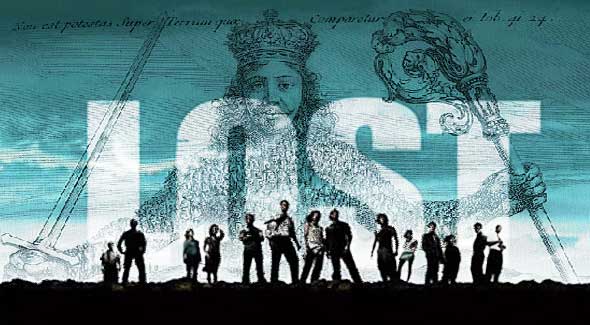

I dunno, while I agree that Sayid’s episode didn’t fall into the same thematic round hole as well, maybe that was the point. To show that fate still has some hand at play despite the strongest resistance against it. Honestly, I don’t think I could have bought a storyline where the character took the high road.
I think (and this is a point I made in the Open Thread) that conclusions are being jumped to before all the facts are in. Just because Sayid “murdered” at the end of ‘Sundown’, that wasn’t the final moment of the story, remember? It ended with Sayid hearing a noise and investigating, then finding Jin tied up in a storage room. Now this story hasn’t been fully played out yet, but i’m betting that we’re supposed to think that Jin would have been killed without Sayid’s intervention and that Sayid therefore saved his life – and of course if he hadn’t killed Keamy and the others he probably wouldn’t have known anything about Sideways-locked-up Jin. So even though he is still a “murderer” in the alt-2007 world, his actions inadvertently saved good-ol’-Jin, a character the viewers believe has achieved redemption and deserves to live and be reunited with Sun. Whereas on the island he murdered Dogen and his lackey in order to bring chaos and destruction to all his previous friends. Isn’t there irony in there somewhere?
I realize this is probably underthinking a bit, but, for me, that same-old-same-old was probably why I felt unsatisfied by “Sundown,” too. But I don’t think it came from a lack of irony, per say, just that I am goddamned sick of Sayid always ending up doing a Bad Thing in the name of some Good all the bloody time. I groaned out of frustration/emotional exhaustion, “Aaaw, SayIIIIID!” when he shot Keamy the way you groan at a kid for doing something naughty for the umpteenth time. Like, “Really? REALLY? You’re gonna do *that*?” That feeling isn’t about irony, I think, because altaSayid knew just as well as I, as a viewer, knew how he’s constantly doing bad and can never seem to catch a break. I think Sayid and I alike are tired of it. In that sense, it’s sort of nice to have some camaraderie with the poor sap.
Was there irony in how alternaWhat’shisname (the science teacher) was complaining about stains on his shirt, while in the original timeline, he WAS a stain on peoples’ shirts? And further, from out-dated equipment vs. outdated explosives. I chuckled to myself during that little bit.
Call me crazy, but I actually thought the, “You can have mine,” part between the two teachers was kind of important, too. Whether it was to just shut the guy up or out of a feeling of guilt for not delivering what was promised, alternaBen still did something out-of-sync with original Ben by giving up that space. Original Ben would have told him to zip it or given him a, “Sucks to be you, du’n’ it?” look/shrug and gone on his way if a plan of any kind didn’t work out and someone was giving him a hard time for it. Then again, Original Ben would also have figured out a way to *make* it work, like having the principal write the letter and then going after him later- and, actually, *that* was what I was sort of anticipating for a little bit, some sort of twist at the end to show how Ben actually did go after the principal. The fact that it didn’t happen, does, indeed, make it more satisfying, or at least satisfying in a different way. I guess, for me, the “same old Ben” doesn’t get old because it’s not depressing to watch like Sayid’s- his shows a badass that can talk his way out of or into anything, a master manipulator at work, basically the exact OPPOSITE of Sayid in a lot of ways. Sayid is totally powerless in so many ways that watching his episodes is like rubbernecking or watching a train wreck- it hurts, but is unavoidable. So I think I still would have felt “satisfied” if alternaBen had pulled it off, since it wouldn’t have hurt my soul as much as seeing Sayid do the same things he always does.
You’d have felt better if Sayid arranged the killing of his own brother? Harsh dude. :)
I was a little more satisfied by Sundown then everyone else seems to be. I liked that for most of the series, we were led to believe that Sayid was a good person who was forced to do bad things by circumstance. I think the reveal in this episode that he’s really just a bad person pretending to be good. I mean, three distinct times in the series he goes back to his bad ways. Once when he tortures Sawyer for the medicine, once when he (I think) tortures Ben in the Hatch, and once when he just blindly starts killing people at Ben’s word.
I think the “alternate look” in the second timeline is that Sayid doesn’t have to discover that he’s a bad person trying to be good. He just knows he’s a bad person.
@Gab and mlawski: as for more Arzt irony, someone on one of the other umpteen recaps I read made the (abstract) connection that Arzt in sideways-2004 is using outdated equipment from the 1950s; in regular 2004/2007, the Others are using outdated equipment from the 1950s (i.e., everything they took from the U.S. military when they came to the island).
@jimp: as for Jin and Sun in the alt-universe… is it possible that Jin’s search for Sun will last most of the season in order to correspond with what’s going on between them on the island? Or, worse: is Sun dead? Think about it: up until “Sundown,” the episodes ran parallel to Season One, both in terms of characters being explored and plotting. So “Sundown” shouldn’t have been a Sayid ep — it should have corresponded with Sun/Jin. But Sun was nowhere to be seen… is it even possible that the title of the episode is a play on the two of them, and that it describes the fact that in the sideways universe, Sun has actually been killed (“Sun = down”)?
Kevin, I hope not. If they kill Sun, I might have to stop watching the show. I LOVE HER THAT MUCH.
The best Arzt irony is when he says he smells like formaldehyde. Because on the island he’s dead. Get it?
I too am a Sun worshipper. Don’t let the Sun go down on me! (On second thoughts…)
Wouldn’t matter if Sun was dead anyway in the alt-universe. They’re all gonna have to sacrifice the possibility of living in that reality in order to prevent whatever bad stuff is gonna go on on the island. Is my prediction.
I liked both Sundown and Dr.Linus a lot, but for different reasons. Sundown may have been more of a guilty pleasure; watching Sayid being a badass is always enjoyable to me. Dr.Linus was definitely more of an epic character driven story. I agree entirely with the content of the article.
As for Jin and Sun, they will get their own episode soon I’m sure. We’ll find out what was going on with Jin in that freezer contrasted with Sun and Jin finally meeting up on the island. I bet we’ll have to sit through a Hurley episode first, though.
Loved Dr. Linus, officially my favourite episode of the series so far. I cried a couple times, I had a big goofy grin on my face at all the other times. A lot of those bits could not have been done by another actor – not as well, at least – Michael Emerson is incredible.
“Because no one else will have me.”
Is probably my favourite moment in the series to date.
Michael Emerson needs an Emmy this year.